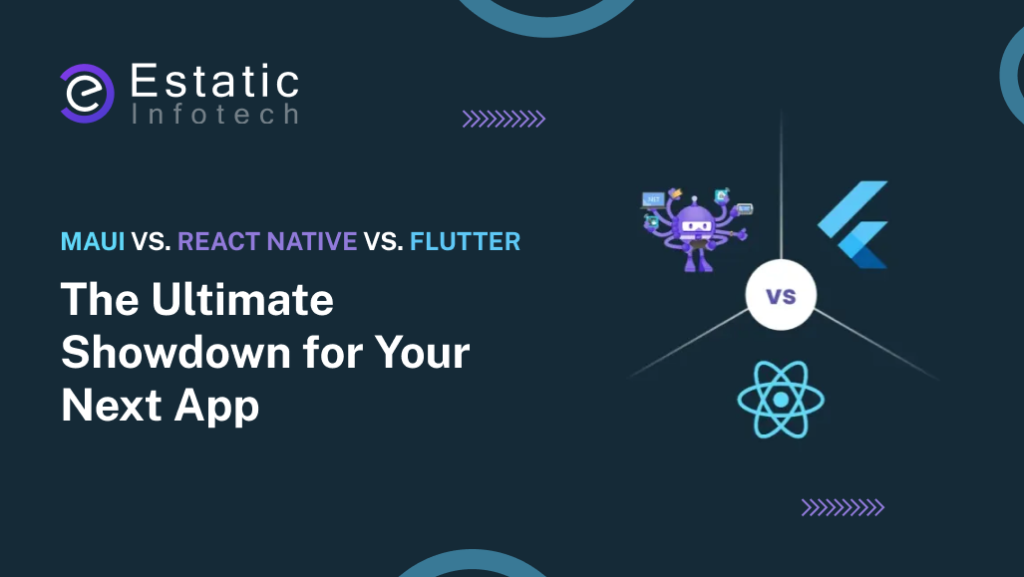Choosing the right cross-platform framework can define your app’s success. Explore how MAUI, React Native, and Flutter stack up in terms of performance, flexibility, and scalability—so you can make the perfect choice for your next app.
Table of Contents:
- Introduction
- What is .NET MAUI?
- What is React Native?
- What is Flutter?
- MAUI vs. React Native vs. Flutter: Key Comparison
- Which Framework Should You Choose?
- Final Thoughts
Introduction
In today’s competitive app development landscape, businesses are increasingly turning to cross-platform frameworks to build powerful, cost-effective, and consistent mobile experiences.
Among the top contenders are .NET MAUI, React Native, and Flutter—each offering distinct advantages for developers and enterprises alike.
Choosing the right one can be a game-changer. This detailed comparison will help you decide which technology best fits your project requirements and long-term business vision.
What is .NET MAUI?
.NET MAUI (Multi-platform App UI), developed by Microsoft, is the next evolution of Xamarin.Forms. It allows developers to create apps for Android, iOS, macOS, and Windows from a single codebase using C# and XAML.
Key Highlights:
- Unified framework for all platforms under .NET 6+.
- Tight integration with Visual Studio for streamlined development.
- Reusable business logic and UI components.
- Supported by Microsoft’s robust developer ecosystem.
Best For: Enterprises leveraging Microsoft technologies and teams proficient in C#.

What is React Native?
React Native, created by Facebook (Meta), revolutionized mobile app development by enabling developers to build native-like apps using JavaScript and React. Its flexibility, massive community, and near-native performance make it one of the most popular choices.
Key Highlights:
- Fast development with hot reloading.
- Code sharing across Android and iOS platforms.
- Easy integration with native APIs.
- Backed by a vast ecosystem of third-party libraries.
Best For: Businesses seeking rapid development, scalability, and access to a large developer community.

What is Flutter?
Flutter, developed by Google, uses the Dart programming language and stands out for its expressive UI, consistent performance, and support for multiple platforms—including Web and Desktop.
Key Highlights:
- Custom UI through widgets-based architecture.
- Native-like performance with Dart’s AOT compilation.
- Ideal for creating visually rich, high-performing apps.
- Strong and growing developer community.
Best For: Businesses prioritizing UI/UX quality and looking for consistent experiences across mobile, web, and desktop platforms.

MAUI vs. React Native vs. Flutter: Key Comparison
| Feature | .NET MAUI | React Native | Flutter |
|---|---|---|---|
| Language | C#, XAML | JavaScript, TypeScript | Dart |
| Performance | Excellent (near-native) | High | Very high |
| UI Framework | XAML-based native UI | Uses native components | Custom widgets |
| Community Support | Moderate (growing fast) | Very strong | Strong & expanding |
| Learning Curve | Easy for .NET developers | Easy for web developers | Moderate |
| Best Use Case | Enterprise-level apps | Fast MVPs & startups | UI-rich, high-performance apps |
| Ecosystem | Microsoft-backed | Open-source | Google-backed |
Which Framework Should You Choose?
Choosing between MAUI, React Native, and Flutter depends largely on your business goals, tech stack, and developer expertise:
- Choose .NET MAUI if you’re invested in the Microsoft ecosystem and need robust Windows and enterprise app support.
- Choose React Native if you prioritize a shorter development cycle and have a team familiar with JavaScript and React.
- Choose Flutter if you want pixel-perfect UI consistency, superior performance, and a single codebase for multiple platforms.
No matter your choice, all three frameworks empower businesses to deliver scalable, high-quality cross-platform apps efficiently.

Final Thoughts
Whether it’s MAUI’s enterprise-grade structure, React Native’s flexibility, or Flutter’s modern UI power, each framework shines in its own way. The key is aligning your app’s requirements with the strengths of the technology.
At Estatic Infotech, we specialize in delivering custom app development solutions across all major frameworks. Our expert team ensures that your mobile app not only looks great but also performs seamlessly across all platforms.
Transform your ideas into engaging digital experiences with Estatic Infotech’s cross-platform development expertise.
Visit Estatic Infotech to explore more about our mobile app solutions.

